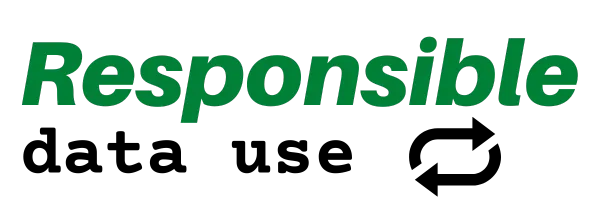Use Cases
Where, why and how you can take advantage of Responsible Data Use
Introduction
You can take advantage of the benefits of responsible data use anywhere personal data is used.
Our experience is with data protection and privacy management in hotels, direct marketing, healthcare and for charities. The principles stay the same, how you go about achieving results varies from business to business.
Sometimes senior management wants to talk in terms of "compliance" or "governance" - and that's fine. After all, "compliance" is essential if you're going to take this seriously and governance is something senior management strives to prove their accountability for.
In our world responsible data use distributes accountability throughout the organisation. It may be an unpopular opinion in some places but we have found that the people who get excited about "governance" are rarely the same people who actually process the personal data. People respond more positively to being responsible for their work than they do to the thought of their actions being governed.
Moving on to compliance it has become clear this is only a stepping stone. Once you have achieved the mythical state of compliance you need to be able to maintain it. In the world of data protection and privacy the notion of "compliance" is highly perishable.
Personal data processing has a lifecycle and it needs to be protected throughout. That lifecycle is dynamic - even when data is stored and is at rest, there are active threats and issues with it. Compliance alone might have recognised that on the day it was last checked, responsible data use maintains awareness and an active posture.
To put it another way, achieving "compliance" means you know what the rules of the game are. If you actually want to play the game of realising the value in personal data, you need to become a responsible data user.
Hotels
You can read about how responsible data use is relevant for the hotel industry on this page.
Some hotel directors misunderstand just how much personal data is collected by their business - and how much they can be held accountable for.
There can be a lot - and it is very detailed stuff. In isolation it might appear to be nothing to worry about. When it is combined, especially when combined with data from other sources, it becomes a concern.
With hotels collecting data about their customers while they work, play or even sleep in their premises, there is a constant, incremental growth in the body of information held about the habits, preferences, characteristics, likes and dislikes of an individual. Often this body of knowledge is held long after a guest has departed. Few other business types get such easy access to this behavioural data.
Just the sort of thing that can cause problems if it falls into the wrong hands. Just one of the issues which can lead to a hotel customer feeling vunerable.
Responsible data use helps hoteliers create the conditions where they can access, protect and enhance the value in customer data (there is value here for both the customer and the business).
At a time when hotels are under pressure to make more use of technology and customer data to "personalise" the guest stay, it makes sense for this accelerated use to be tightly controlled.
Direct Marketing
Direct marketing is of course the branch of marketing that explicitly makes use of personal data. It is "direct". It is going after specific individuals.
Those individuals have rights over how their personal data is used. And woe betide you if they discover you have failed to respect those rights.
You can use responsible data use to make your marketing databases fitter, more relevant and safer.
Technology Providers
Hotel technology is moving fast. The pressure on hoteliers to make use of advanced technologies to collect and use customer data has never been higher.
You should be able to make use of technology where it can improve your business and enhance your relationships with your customers. However part of that relationship is about showing respect for their data and privacy and making sure you have effective information governance foundations in place.
If you want to make sure technology works for you without making your hotel business even more vulnerable, start here.
HR
You can see a list of the purposes for which HR departments collect and use personal data when you visit this page.
If you are responsible for HR data, take a look at our list and see how you're getting on with that?

